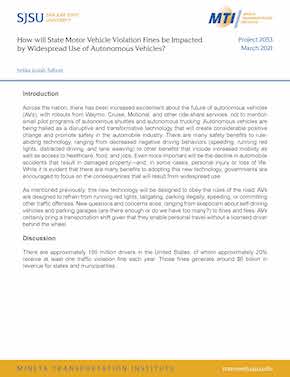- 408-924-7560
- mineta-institute@sjsu.edu
- Donate
How will State Motor Vehicle Violation Fines be Impacted by Widespread Use of Autonomous Vehicles?
Across the nation, there has been increased excitement about the future of autonomous vehicles (AVs), with rollouts from Waymo, Cruise, Motional, and other ride-share services, not to mention small pilot programs of autonomous shuttles and autonomous trucking. Autonomous vehicles are being hailed as a disruptive and transformative technology that will create considerable positive change and promote safety in the automobile industry. There are many safety benefits to rule-abiding technology, ranging from decreased negative driving behaviors (speeding, running red lights, distracted driving, and lane weaving) to other benefits that include increased mobility as well as access to healthcare, food, and jobs. Even more important will be the decline in automobile accidents that result in damaged property—and, in some cases, personal injury or loss of life. While it is evident that there are many benefits to adopting this new technology, governments are encouraged to focus on the consequences that will result from widespread use.
As mentioned previously, this new technology will be designed to obey the rules of the road: AVs are designed to refrain from running red lights, tailgating, parking illegally, speeding, or committing other traffic offenses. New questions and concerns arise, ranging from skepticism about self-driving vehicles and parking garages (are there enough or do we have too many?) to fines and fees. AVs certainly bring a transportation shift given that they enable personal travel without a licensed driver behind the wheel.
Selika Talbott is a MTI Research Associate and Professorial Lecturer at American University in Washington, DC. She is currently researching and educating on autonomous vehicle policy, impacts on governments, OEMs and stakeholder communities. Selika was formerly the Deputy Administrator for the State of New Jersey Motor Vehicle Commission in charge of all Operations for state services, the Director of Field Operations for the FMCSA (Federal Motor Carrier Safety Administration) and has over 18 years’ experience as an attorney litigator. Selika currently serves on the Academic Advisory Council of PAVE (Partners for Automated Vehicle Education) and is passionate about supporting people and organizations that are in pursuit of an equitable transportation network that provides mobility and freedom of movement for all.
-
Contact Us
San José State University One Washington Square, San Jose, CA 95192 Phone: 408-924-7560 Email: mineta-institute@sjsu.edu






